As we grow older, we find ourselves sick with nostalgia. Dissatisfied with the life we have, we wonder what would have been if our circumstances were different.
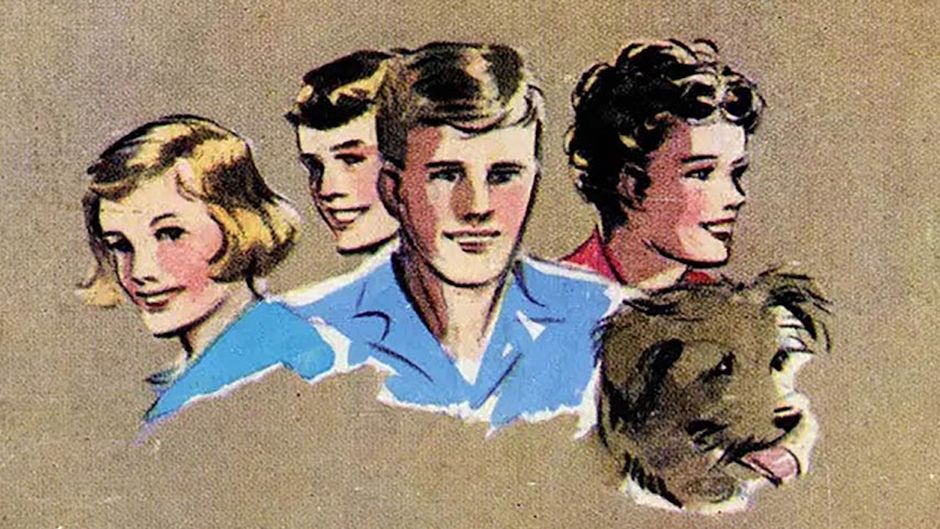 The Famous Five were four humans and a dog. Three were siblings, the fourth was a girl cousin who wanted to be a boy.
The Famous Five were four humans and a dog. Three were siblings, the fourth was a girl cousin who wanted to be a boy.
Who hasn't wanted to discover treasure caves, decipher hidden messages, and find mysteries behind the closed curtains of the kindly neighbour across the street?
Many of us have been sentimentally educated through reading the series of Enid Blyton's books. The Famous Five are back in a series produced by the BBC with Germany's ZDF and France's TF1, directed by someone as un-childish as Nicolas Winding Refn.
Guillem Medina tells us in a book that "he always wanted to be one of the Famous Five" (Diábolo Ediciones, Madrid, 2017) while Antonio Orejudo casts a nostalgic look in The Famous Five and me (Tusquets, Barcelona, 2017) at a past that settles accounts with lost hope.
If the former takes us back to the beginnings of the so-called "juvenile novel", to rediscover our childhood with The Happy Hollisters or The Three Investigators, the latter makes an autobiographical portrait of the last generation of Francoism, to which many of us belong because of the late Spanish "baby boom" of the 1960s.
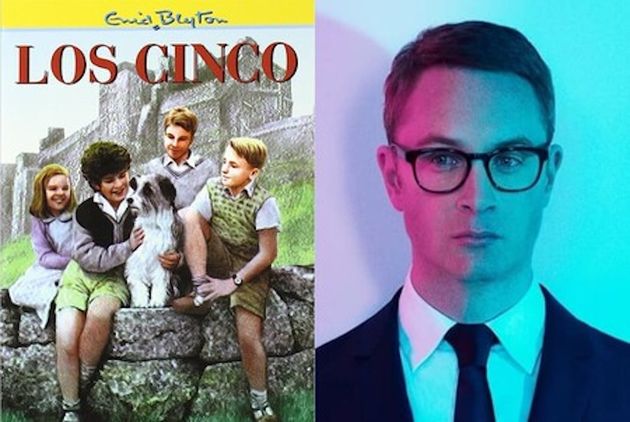
We go from magical kingdoms, pirates, and intrepid explorers to the everyday heroes of the 1970s, kids our own age who went on adventurous gangs.
It is not surprising, therefore, that Orejudo establishes a parallel between the fictional characters and his real childhood friends.
In passing, he goes through the continuous changes in the educational system, the relaxation of family rules, the "progressivism" of the 80s and the new habits that made us discover drugs, rock, and youth fashion.
The story of the woman who bears the name Enid Blyton (1897-1968) is not an edifying one, for those who idealise the "family values" of a childhood that did not exist as we now remember it.
Shortly after her 13th birthday, his father left the family home in London to live with another woman, after a long and fractious marriage. Hers was not much better.
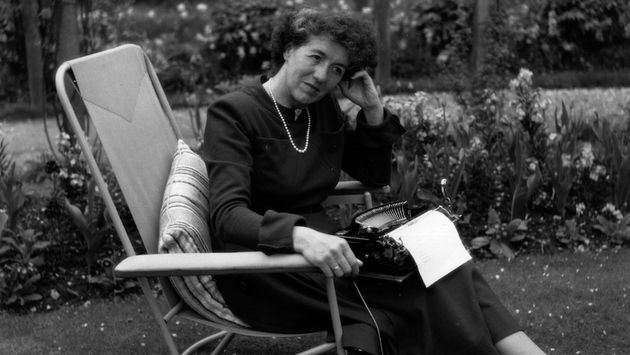
[photo_footer]The story of Enid Blyton (1897-1968) is not an edifying one, for those who idealise the family values of a childhood that did not exist as we now remember it.. [/photo_footer]
Enid married a divorced publisher in 1924, who already had two children, to remarry a surgeon in 1942. That was the year The Famous Five were born, although they were not published in countries like Spain until 1965 - here everything came late, as we all know.
She wrote one book a year, 21 in total - nothing comparable to the 753 titles she wrote with many other characters, 16 a year, no less! Her charming stories have left us with an endearing aftertaste, which we relate to friendship, love of nature and excursions full of mysteries... who could have imagined that the author had a complex and dark side?
Given to drinking, as a mother she left much to be desired. Arrogant and insecure, she could be quite unpleasant. She was quite unhappy. She had affairs outside marriage, even with her daughters' nanny. Although the latter is suggested by a biographer who married her first husband.
Therefore, it is not surprising that the biographer drops vague insinuations in the book, such as Blyton's supposed sympathy for Hitler and her racist ideas, only because she said nothing at a dinner party about it in the late 1930s.
There are visitors who remember her playing tennis in the nude, although they don't say if her opponent was dressed!
What is clear is that Blyton wrote for children, but she couldn't stand her neighbours' children. That's not so unusual, though, is it?
When my mother, who was a teacher, was asked if she liked children, I remember that sometimes she would honestly answer that she liked her own children, that is, me, an only child.
The love of our childhood, like all generalities, is an abstraction. It is what produces nostalgia, the idealisation of a time that was not as we remember it. Memory is capricious. It remembers what it wants. The rest, we prefer to forget. Our lost childhood - let's not fool ourselves! - is a reconstruction.
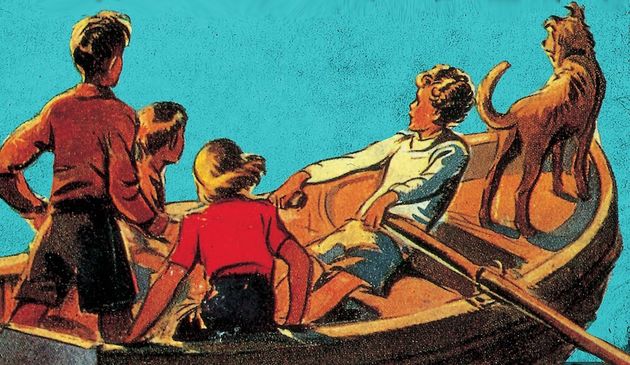
[photo_footer]Her charming stories have left us with an endearing aftertaste, which we relate to friendship, love of nature and excursions full of mysteries.[/photo_footer]
Even when we were children, we found those cottages where they had kidneys or stewed plums for breakfast, but everything tasted like ginger, to be a little strange.
There was an old-fashioned air about those Edwardian-style cottages, where these boarding-school kids, barely controlled by lunatic uncles or quirky tutors, were surrounded by pets. It was nothing like our holidays, but we recognised the desire to be free, like them.
The Famous Five were four humans and a dog. Three were siblings, the fourth was a girl cousin who wanted to be a boy -it wasn't all that normal either!
Julian was 12 years old and a self-sufficient character, which was a bit annoying. Dick, 11, was a bit more fun. Anne, 10, was the one who always put her foot in her mouth by talking too much, due to her frightening character.
And the most interesting was undoubtedly Georgina - I love that name, although she preferred to be called George, as if she were a boy -, the short-haired cousin with the tomboy manner.
"Memory is hunger", wrote Hemingway. We all long for a better time, which is not as we remember it, but shows a desire for a better life. That longing points to the truth of faith, said C. S. Lewis. He identified it with Heaven, which he related to the change of seasons, childhood memories and the feeling of being at home.
Home is something absent in the stories of The Famous Five. They are never at home. They live in a boarding school, and nothing is said about their parents. It is this rootlessness that drives them to adventure.
Like the heroes of ancient times, they are on a journey into the unknown. Their journey is not an escape from the world, as in fantasy literature, nor an escape into the past, as we now remember those holidays, but a search for the thrill and passion of living.
As we grow older, we find ourselves sick with nostalgia. Although we know it is an illusion, we try to escape from a reality that we find grey, annoying, or painful. Dissatisfied with the life we have, we wonder what would have been if our circumstances were different.
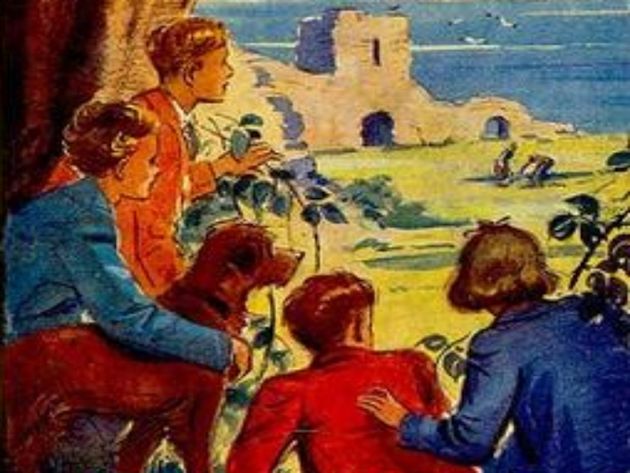
[photo_footer]Home is somewhat absent in the stories of The Famous Five, who live in a boarding school, and nothing is said about their parents, but this uprootedness drives them to adventure.[/photo_footer]
“Do not say why were the old days better than these days", says the Preacher of Ecclesiastes in the Old Testament, “for it is not wise to ask that" (7:10).
Accepting an unsatisfactory reality frees us to live our present circumstances. And it gives us all the more reason to hope. The happy ending always has that eschatological meaning.
When we look to the past, longing for happiness, we forget that it is by looking to the future that every desire will be satisfied.
This story has a happy ending, when we trust in the One who, by giving his life, not only recovers it, but gives us a better life, by knowing the Author of life. There is no greater adventure. The best is yet to come.
José de Segovia, theologian, journalist and evangelical pastor in Madrid.

Las opiniones vertidas por nuestros colaboradores se realizan a nivel personal, pudiendo coincidir o no con la postura de la dirección de Protestante Digital.
Si quieres comentar o